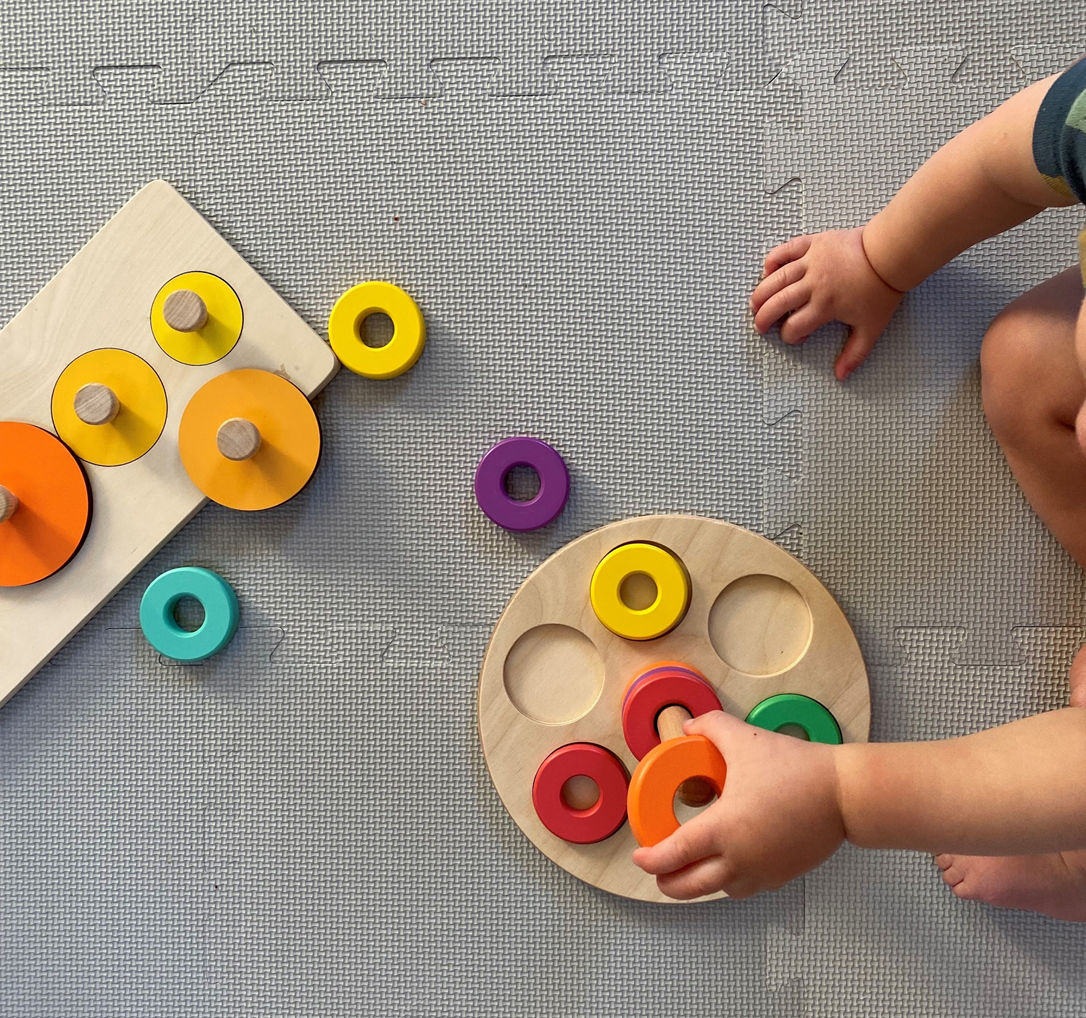Early childhood educators play a crucial role in supporting young children’s learning and development. To support this workforce, OSSE launched the DC Leading Educators toward Advanced Degrees program (DC LEAD). DC LEAD provides incentives of up to $3,000 and scholarships to help early childhood educators who meet the District’s education requirements or are working towards meeting them. The Lab helped design the program’s application process. We also engaged early childhood educators in shaping the program’s design through interviews and a co-design session. Through those conversations, early childhood educators shared what they need to succeed in DC LEAD and beyond.
Toddler playing with wooden puzzle toys.
(Credit: Karissa Minnich)
Why is this issue important in DC?
Early childhood education programs help prepare young children for success in school and life. The benefits can follow children all the way into adulthood.1 In 2016, the Office of the State Superintendent of Education (OSSE) increased the minimum education requirements for early childhood educators to improve access to high-quality care for DC’s youngest learners. DC LEAD will help eligible early childhood educators to meet the education requirements. It also aims to attract and keep new early childhood educators in DC.
What did we do?
With OSSE and its grantee, Southeast Children’s Fund (SCF), we first mapped the steps an early childhood educator would take to apply to DC LEAD. This process helped us visualize the applicant experience from start to finish. We then created an application form using best practices in design and behavioral science. We also tested the form with educators to make sure the process was easy to understand. DC LEAD started accepting applications for scholarships and incentives in early June 2022.
Early childhood educators who get scholarships from DC LEAD will get mentors and program advisors assigned to them too. To help OSSE and SCF shape how these resources would be provided, we talked to early childhood educators one-on-one. We spoke to them about their long-term career plans and what traits they would like in a mentor. We then led two co-design sessions with early childhood educators in DC LEAD. One session was held in English and another session was held in Spanish. In both sessions, early childhood educators shared their concerns about working and studying at the same time. They also shared ways DC LEAD could further support them while they are in school.
What have we learned?
It is generally important to test new application forms with people who do not speak English as their primary language. This was particularly true for DC LEAD, because many early childhood educators speak a primary language other than English. Early on, the online application form had a translation button where people could access content in other languages. However, we learned that it was too easy for people to miss the button we included. To fix this, we made the first page of the online form a single question about language preferences. We also changed the color and size of the translation button on all other pages to make it easier to see.
Talking to early childhood educators also taught us a lot about what they need while in school. They told us that they want mentors who have taken similar classes and held the same jobs as them. Some also want more guidance on how to achieve their educational and career goals. Early childhood educators often preferred certain classes too. They especially like classes offered online, at different times, and in different languages. These options allow them to take classes in a way that fits their needs. Furthermore, we heard that early childhood educators want to focus on school and work. They don’t want to worry about whether their scholarship provider will pay their tuition on time. They also need help finding people to cover their shifts when they have to study.
What comes next?
DC LEAD is no longer accepting applications in Fiscal Year 2023. Southeast Children’s Fund will continue to use the results of the co-design sessions to shape its work with universities. For example, SCF has shared insights from the sessions with financial aid staff and others involved in billing. Additionally, SCF provided a list of DC LEAD scholarship recipients to universities, so they know who is in the program. SCF will also use the results to inform the responsibilities of mentors and program advisors. Finally, we trained SCF to lead future co-design sessions with early childhood educators.
We wanted to evaluate whether the incentives from DC LEAD help keep early childhood educators in DC through a randomized or quasi-experimental evaluation. In the end, we could not run a randomized evaluation because demand for the incentives did not exceed their availability enough. Finding the right comparison group for a quasi-experimental study was also tricky. The people who decided to apply to DC LEAD are likely different in key ways from the people who decided not to apply.
“At the heart of our effort to expand access to affordable child care and meet growing demand across the District, we know that we have to be more innovative in finding more spots in more places and improving quality throughout the District. ”

